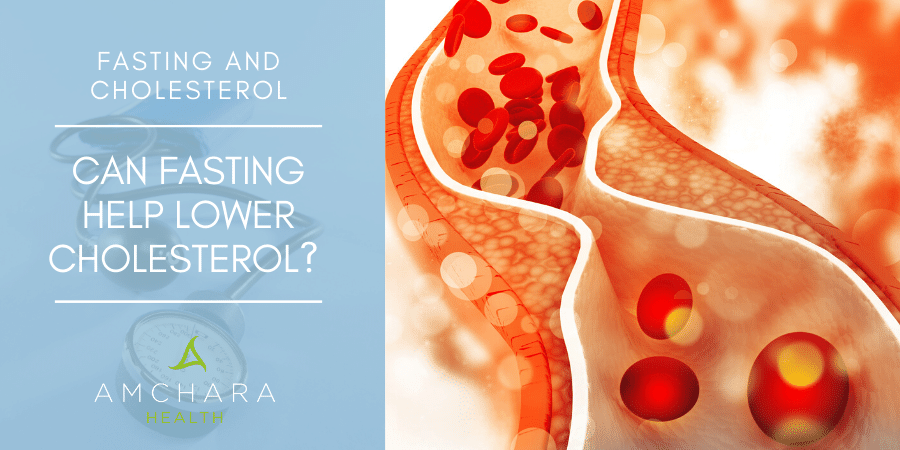Topics Covered in this article:
Recent research has discovered many health benefits associated with fasting – abstaining from food for a certain period of time.
Our mission is to bring you insightful information and evidence-based content and we aim to provide you with actionable knowledge and tips to help you on your journey to optimal health.
In this article, we’ll have a look at how fasting can affect cardiovascular health, specifically cholesterol levels.
What is fasting?
Fasting has been practiced for centuries by many cultures and religions. Strictly speaking, fasting involves going without any food at all, often for a day or number of days, but also for shorter periods within 24 hours.
You’ll often see the term intermittent fasting used – this type of fasting is simply periods of fasting followed by an eating period or window. It’s also sometimes called time restricted eating (TRE). This forms the basis for the 16:8 eating plan, where no food is eaten for 16 hours, with the eating window restricted to eight hours in each day.
Although some people do find fasting helps them to manage their weight, fasting is also associated with a wealth of other health benefits. It’s likely science is only starting to scratch the surface with regard to the many benefits of fasting.
However, fasting has been consistently shown to support cardiovascular health.
Cholesterol and heart disease
Heart disease is a leading cause of premature death worldwide. In the UK, according to the British Heart Foundation, heart disease causes more than a quarter of all deaths each year, translating to one death every three minutes (1).
Cholesterol is a fatty substance, carried around the blood attached to molecules called lipoproteins. It can exist piggy-backed onto high density lipoproteins or those of low density. This is why cholesterol is known as HDL (high density) or LDL (low density).
Science tells us LDL cholesterol is frequently laid down inside the artery walls; this can lead to narrowing and stiffening of the arteries, and is why it’s been termed ‘bad’ cholesterol. HDL on the other hand is not connected with increased cardiovascular risk, which has led to it being named ‘good’ cholesterol.
It’s very likely there is a lot more to learn about cholesterol. Many more factors are involved in heart attack risk than simply the relative levels of HDL and LDL cholesterol, however, as we know low levels of HDL cholesterol are considered a risk factor, it’s useful to look at what factors may affect these levels, such as fasting.
Fasting and cholesterol
Research has consistently found fasting is connected with a reduced incidence of coronary artery disease.
Researchers in one study looked at a religious community in America, notable for having a lower risk of cardiac disease than the general population. These people incorporate regular fasting into their lifestyles. It was found the benefits of fasting were significant even after taking into account other possible contributory factors such as avoiding smoking (2).
This study acknowledges it can be difficult to separate the effects of fasting on heart health from other lifestyle factors. This is because many people who fast do so either for religious or health reasons, and in both cases, may also adopt concurrent healthy lifestyle factors such as avoiding alcohol or cigarettes, or practising meditation to reduce stress. Alternatively it may be that as a result of regular fasting these people are a healthy weight.
But the effect of fasting on cholesterol levels has been studied in the relatively controlled environment of a short term fast. One study showed fasting for 24 hours on alternate days for 12 weeks decreased levels of LDL cholesterol and increased levels of protective HDL cholesterol (3).
In other research, a one day water only fast was shown to reduce the level of triglycerides as well as increasing HDL cholesterol.
High triglycerides are a risk factor for heart disease, because they can lead to hardening of the arteries, and are frequently connected with metabolic syndrome. This is a group of risk factors linked to the development of heart disease, stroke and diabetes, which also include high blood pressure, high blood sugar levels and insulin resistance, excess belly fat and low levels of HDL cholesterol.
The above studies examined water fasting for one day or more, and researchers have also looked at intermittent fasting. In rodents, intermittent fasting was seen to lead to lower LDL cholesterol (4).
People who observe Ramadan undergo a period of fasting from sunrise to sunset for around a month each year. In one review of studies, in which researchers analysed the blood of fasting people during Ramadan, they found HDL cholesterol had increased at the end of the fasting period by as much as 40% (5).
However, the results of some studies have been contradictory, so more research is needed.
Fasting, autophagy, inflammation and cholesterol
The process by which fasting improves cholesterol levels is unclear, however it’s thought that after 10-12 hours without food, the body may begin to use LDL cholesterol as a form of energy, therefore decreasing the levels in the blood (6).
Another explanation as to why fasting may affect cholesterol levels is its effect on inflammation. It’s thought inflammation may encourage the laying down of cholesterol in artery walls, as well as reducing levels of ‘good’ cholesterol and increasing triglycerides.
Over time, damaged cells, pathogens and other debris produced by the body need to be cleared away. This housekeeping process is called autophagy. Fasting is a great way to encourage autophagy, because the process is stimulated during periods when we do not eat. In turn, autophagy appears to reduce inflammation in the body.
Takeaway
Fasting can exert many health benefits and may help in the regulation of healthy cholesterol levels. As a result, fasting may help to guard against heart disease.
There are many ways to fit fasting into your life. Some people benefit both physically and psychologically by undertaking a periodic water fast, either at home or in conjunction with a visit to a health retreat. This can be a great way to reboot healthy eating and lifestyle habits. Others incorporate regular fasting into their week by adopting intermittent fasting.
The 16:8 approach is surprisingly easy to fit into your lifestyle. Many people opt to have a late breakfast and a slightly early dinner – this way the majority of the fasting hours occur when you are sleeping.
If you feel you need support in your fasting journey, a consultation with an Amchara Personalised Health practitioner can guide you every step of the way, with nutritional and lifestyle strategies designed not simply to manage your cholesterol levels, but to improve your overall health.
Gaining your insight helps us to help others. We’d love to hear your thoughts – they often help others to find their path to optimal health.
Did you find this article useful?
Please share your thoughts in the comments.
Ready to kickstart your fasting journey? Check out our cleanses at Amchara Juicery today and receive £20 off your first order. Discount automatically applied at checkout.
Read this next:
- An introduction to fasting
- Intermittent fasting: the 16:8 protocol
- Six potential side effects of fasting
- The mental health benefits of fasting
- Reverse fasting for weight loss and overall health
- Heart health – enough about cholesterol what about homocysteine?
- Control your cholesterol levels – naturally





